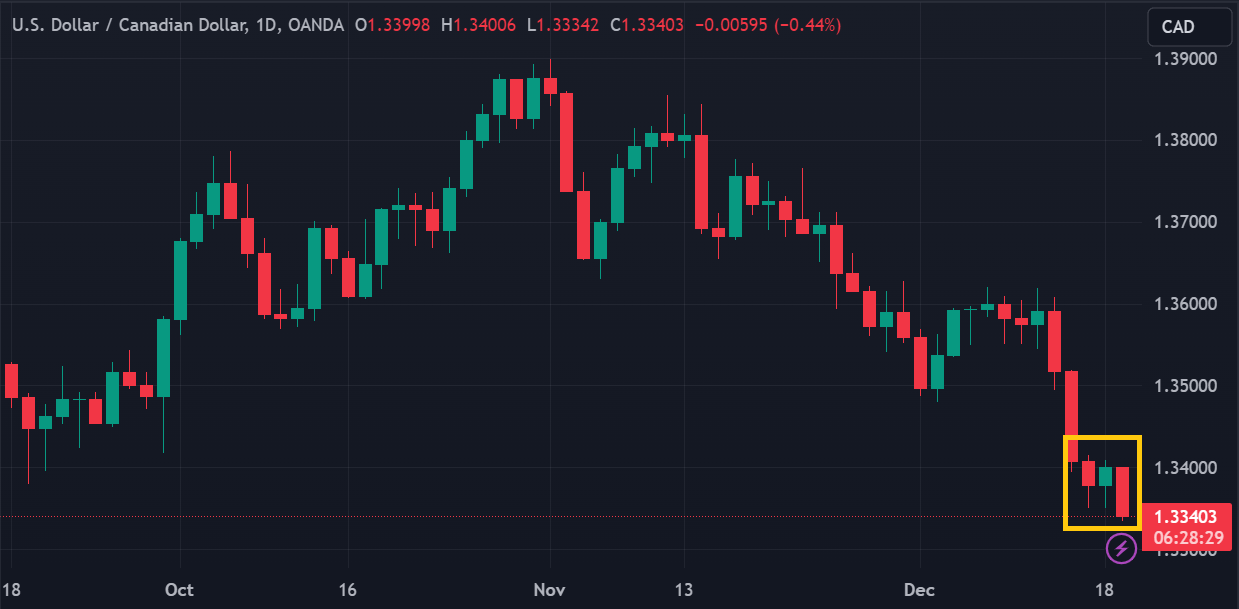Canadian Inflation data seemed to support the BoC to keep interest rates high for longer. However, analysts expected the opposite.
The Canadian dollar strengthened in Tuesday's trading as Canadian inflation data managed to outperform expectations. USD/CAD fell around 0.5% to as low as 1.3330s. However, the pair's decline is likely to be limited as the Bank of Canada (BoC) intends to start cutting interest rates next year.

Statistics Canada reported that the CPI inflation rate increased 0.1% (month-over-month) in November 2023, the same as the previous period. The consensus initially expected the CPI to record -0.2% in that period.
The annual inflation rate stabilized at 3.1%, also ahead of the consensus estimate of 2.9%. Core inflation even edged up from 2.7% to 2.8% on an annualized basis.
The report seemed to support the BoC to keep interest rates high for longer, so USD/CAD fell. However, analysts and BoC officials had a different opinion.
Analysts highlighted the details of CPI-trim and CPI-median, which are said to be the BoC's main policy references. The trend of both parameters has been steadily weakening over this year, to now stand at 3.5% and 3.4% respectively. On a 3-month annualized basis, the figures are even weaker at 2.3% and 2.6%.
"While the numbers on a 3-month annualized basis are indeed volatile if the trend continues over the next few months, it would reassure the BoC that headline inflation is on a path back to target, (thus) opening the door for a rate cut from the second quarter of next year despite the positive surprises in headline inflation today," said Andrew Grantham, economist at CIBC Bank.
The view is in line with BoC Governor Tiff Macklem's comments in an interview yesterday. Macklem said that he expects interest rates to be cut next year.
The BoC's policy direction is usually aligned with its neighboring central bank, the Federal Reserve. Given that the Fed has already taken steps to cut interest rates next year, the BoC is naturally making a similar discourse.

 Dedicated FREE FOREX VPS
Dedicated FREE FOREX VPS Free FOREX Virtual Private Server
Free FOREX Virtual Private Server MT4 Demo Contest, Get $500
MT4 Demo Contest, Get $500 Sign Up for an Account, Claim 60% Deposit Bonus
Sign Up for an Account, Claim 60% Deposit Bonus Free MT4/MT5 VPS 2024
Free MT4/MT5 VPS 2024 Send E-mail and Get Free Merchandise
Send E-mail and Get Free Merchandise $1K Refer a Friend Bonus for Pepperstone Pro clients
$1K Refer a Friend Bonus for Pepperstone Pro clients Maximize Your Earnings with 100% Deposit bonus
Maximize Your Earnings with 100% Deposit bonus Trade to Win, $5,000 Monthly Demo Contest
Trade to Win, $5,000 Monthly Demo Contest Claim 30% + 15% Deposit Bonus from LiteFinance
Claim 30% + 15% Deposit Bonus from LiteFinance






